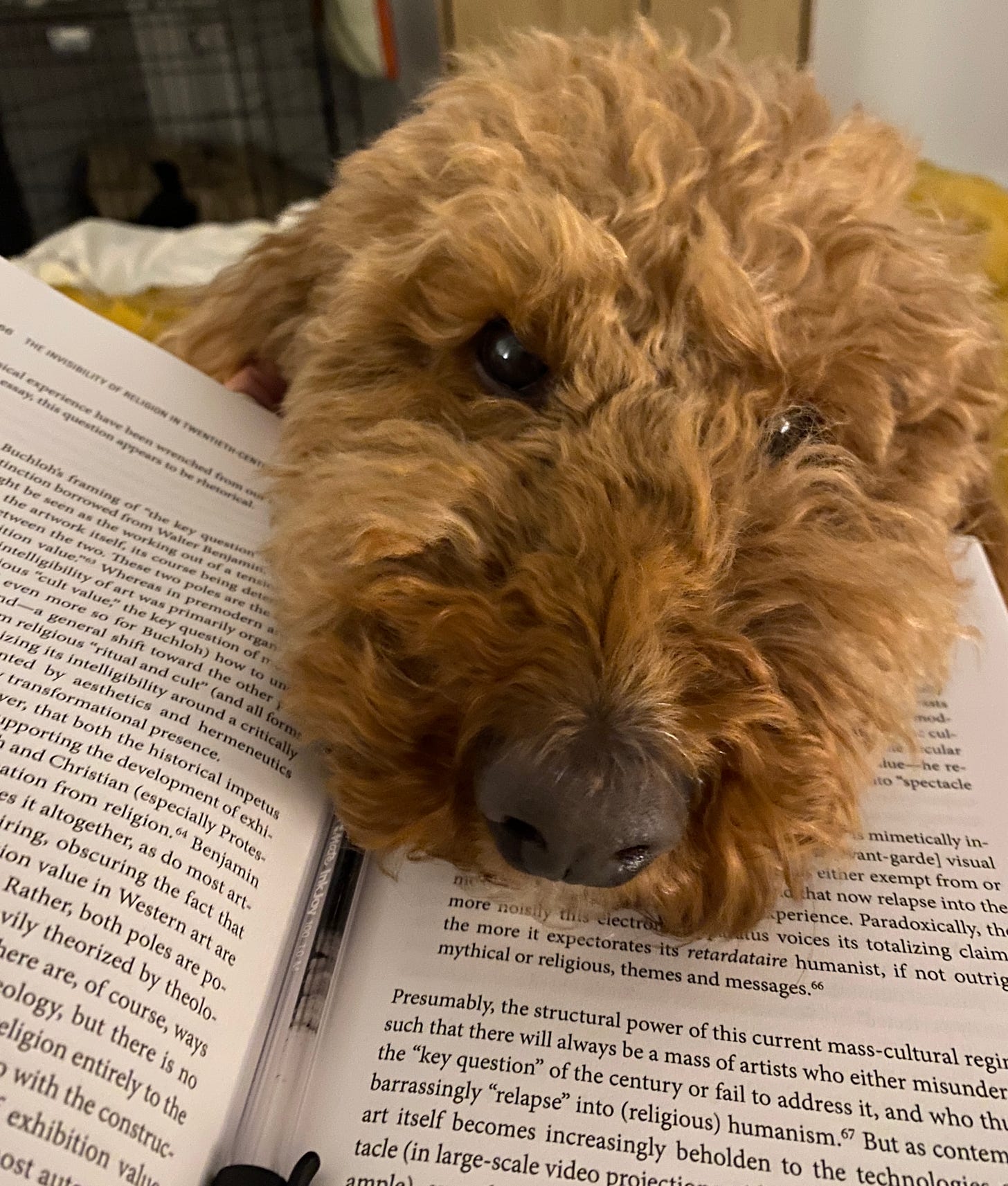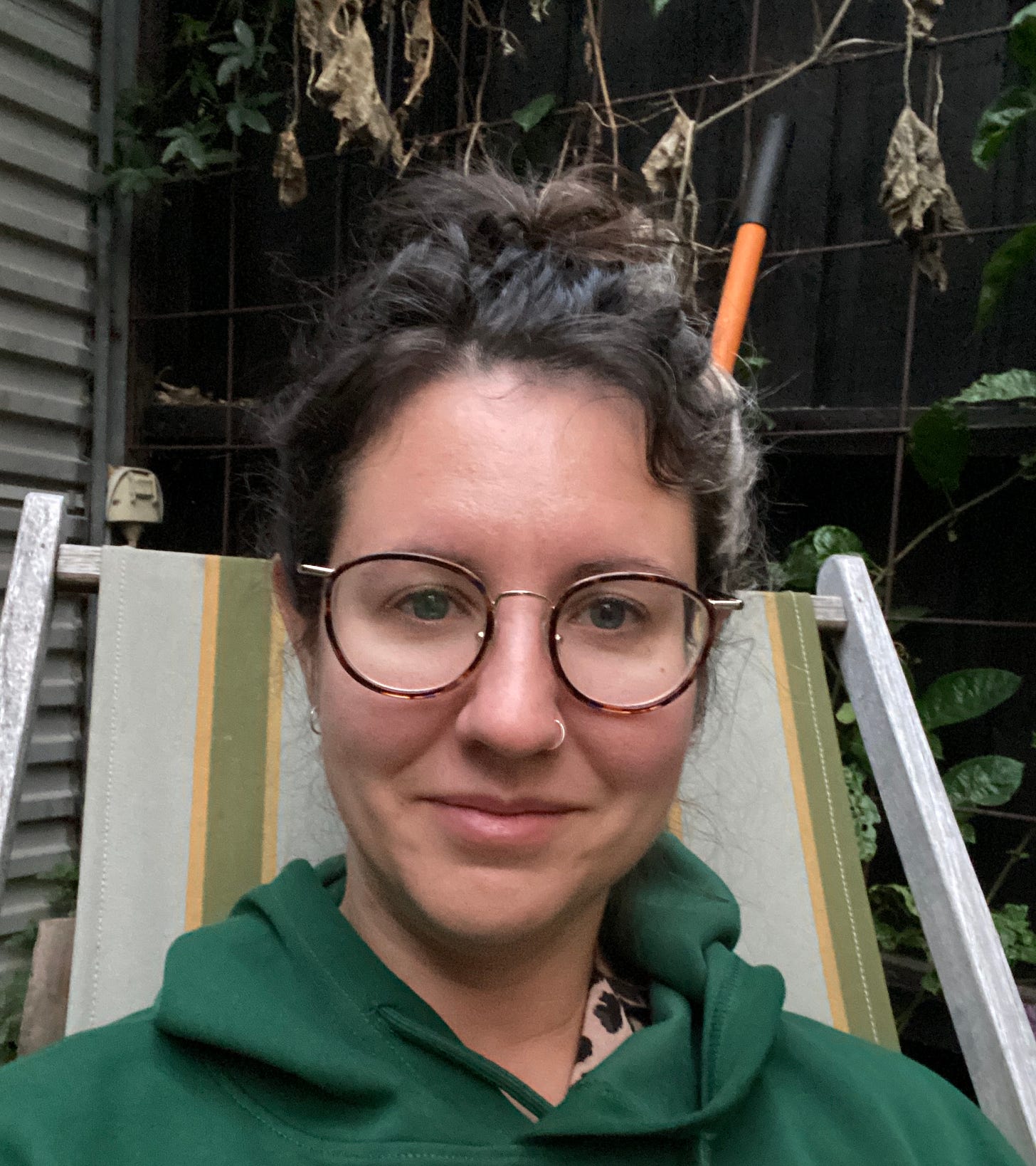Learning to Relate by Deconstructing the Relationship
A guest post on leaving behind heteronormative relationships by Lexi Eikelbloom
Hello and welcome to Healing is my Special Interest — the newsletter at the intersection of late diagnosed neurodivergence and healing from high control environments. Today I am excited to share an essay by Lexi Eikelbloom that fits wonderfully into pride month — a quiet, profound reflection on the pressures of heteronormative relationships in an ideology like white evangelicalism, and the pleasure of living your own one precious life. It’s because of the support of readers like you that I am able to pay and platform autistic writers, so thank you all so very much! Let’s keep deconstructing together :)
When I was 14, my mother predicted that I would grow up to live alone with a dog, surrounded by books. I don’t know what she intended with this prediction but, at the time, it felt like a warning: if you’re not careful, you’re going to fail at human relationships.
I am now 36, and I do indeed live alone with a dog, surrounded by books. From a certain perspective, I have failed at human relationships, even though I tried very hard not to fail. What I didn’t know when I was 14, though, is that it’s possible to succeed at a relationship without actually relating. And it’s possible to fail at a relationship and become better at relating. And it’s the relating, more than the relationship, that matters for your happiness.
As I experienced it, the totalizing nature of evangelical Christianity relied heavily on the concept of “relationship.” The cornerstone of the movement is a personal relationship with Jesus Christ. Adults could ask you at any moment about the state of your relationship with God. How exactly one was supposed to evaluate this was never really clear to me, but we were supposed to be concerned about it nevertheless. The fact that I had a good relationship with my parents, which mostly meant that I was obedient and mature and could converse with them like an adult, was a point of pride for them. Once I hit adolescence, the rules around sexual purity were presented as being for the purpose of protecting our future relationship with our spouses. As a child and an adolescent, I was somehow responsible for quite a lot of relationships.
And it seems like this must be a good thing, right? Because who can argue with the importance of relationships?
In reality, the evangelical concern for relationships was selective. There wasn’t much concern for our friendships, for example. Relationships with those who were not part of our religious group could be justified only in instrumental terms: the relationship could not exist for its own sake but was justified on the grounds of evangelism. “Relationship” really meant allegiance to the heterosexual patriarchal nuclear family structure.
In an essay about raising her son in the context of her lesbian relationship, Audre Lorde mentions in passing that her son has had “an invaluable model – not only of a relationship – but of relating” (Sister Outsider, 70). In this momentary distinction between relationship and relating, Lorde hints at the fact that a relationship structure and the practices of engaging with another particular human being are not quite the same. We were all very concerned about our relationships, but I’m not sure we understood much about relating.
Around the time my mom made her prediction about my future, my parents sometimes brought me with them to the home of a couple who were unhappy in their marriage. I played with their son while my parents offered amateur couple’s counseling. I do not know what sort of advice they gave, but I knew they were there as authorities, representatives of a more successful relationship. But I also knew that at home, behind closed doors, my parents were unhappy. Or, at least, my mom was unhappy. I know this because she talked to me about her unhappiness, using me for the emotional support she wasn’t getting from my dad. The lesson I learned from this is that the relating can be bad while the Relationship can still be considered successful. The two things – relating and Relationship – became untethered from each other.
While my parents were trying to fix other people’s marriages and avoiding their own, I was sneaking around with my girlfriend. I was relating in a way that fell outside the structures of Relationship and I had no model for how to do it. I call her my girlfriend now, but at the time we didn’t even have language to define our relationship. We were friends but the friendship wasn’t typical and everyone knew it. We were a secret in plain sight that everyone agreed to turn away from. Relating outside of Relationship gave me freedom, but it was also dangerous. When the relating is teaching you to believe things about yourself that are damaging and untrue, there’s no one to talk to about it. There’s no one there to say “She’s not treating you very nicely. You deserve better.” And when it ends, it’s easy to attribute the pain to your having strayed outside the structure and to fix the pain by turning back to it and clinging to it for dear life.
As far as I was concerned, my feelings had led me astray, just like I had been told they would. Following my feelings had caused me pain. I was abandoned and alone, and the life my mom had predicted was on the horizon. So I pivoted away from relating and towards Relationship. I denounced my longings and emotions. I secured a marriage with the first man who showed interest in me. I didn’t kiss him until my wedding day. I didn’t say “I love you” until I was engaged. Once we were married, we scheduled sex for twice a week since this seemed like the right amount required to protect the Relationship. We read the Bible every evening after dinner, and I read countless books about biblical marriage, the happy couples on the covers promising that if I followed the biblical principles inside, I would feel the way they seemed to feel. Each opportunity for the expression of intimacy was transmuted into a monument to the right way of doing things. If my mother was unhappy, I reasoned, it was only because she wasn’t good enough at doing what was necessary. I would be stronger than she was. And I would not end up alone.
Three years into the marriage and six years into the relationship, my husband and I found ourselves on a Skype call with a Christian counsellor. Baffled by my unhappiness, she told us we were doing everything right but that we just needed to have more fun. So we scheduled time for fun every Saturday between the grocery shopping and the sex, just as, two years before, we created a checklist of emotional tasks - “appreciate something about each other,” “share some new information,” “share a hope for the future” - as a way to manufacture an emotional connection that would make the forced intimacy more bearable for me.
When asked why I ended my marriage, I usually say something about how our values diverged, how he wanted children and I didn’t. All of that is true. But I also think that we - our soft fleshy individuality - got crushed by the weight of the monument to Relationship that we built. We both felt so powerless. We each suspected the other of being in control, but I’m not sure either of us was in control so much as the Relationship to which we had both outsourced our agency. Walking away from my marriage wasn’t about walking away from a person so much as it was about severing my allegiance to Relationship so that I could find everything I had buried to build it.
Five years later, I live alone with a dog, surrounded by books. But what that picture doesn’t necessarily show you is that I also love and am loved. Deconstruction has been many things, but at its heart, it has been a process of learning how to relate, instead of giving myself over to a Relationship. That has meant learning to feel rather than fix my emotions. It has meant valuing fun and joy a little more, and responsibility a little less. It has meant coming out as bisexual. It has meant learning to make decisions, not by consulting a blueprint for my life, but by identifying my preferences and priorities and responding to the particular human and situation in front of me. It has meant allowing myself to make mistakes.
Some days I still feel like a failure, like a second class-citizen, like a wisp of person compared to the real, solid humans whose relationships extend them into the world in recognizable ways. The Relationship still sometimes holds itself out to me as the thing that’s capable of curing pain, of conferring value. I have come to understand that this voice is present because I was taught that connection only comes through the nuclear family, and not because the idea itself is true. So on the days that I feel the loneliness and pain which are that inevitable part of being human for which there is no cure, I mostly no longer believe it means that I am doing something wrong. I just text someone I love, and I pull my dog a little closer.
Lexi Eikelboom is a philosopher and a visual artist. Originally from Canada, she now resides in Melbourne, Australia with her golden doodle, Alan. In addition to her academic writing about art and religion, she writes a newsletter to confront her internalized misogyny at:
Thank you Lexi for this wonderful essay. For those reading, I am curious: how much pressure did you experience to fall into relationship “norms” as a young person? How did this impact you? How have you deconstructed these harmful and rigid boundaries?







The marriage counseling/biblical counseling grift is so real! And all of it is designed to keep people in hierarchical, patriarchal relationships 💔
With a dog surrounded by books sounds amazing to me! I’m so with you on the over-emphasis and over-idealization of the nuclear family. It was a concept that made me miserable for a very long time, believing that I couldn’t obtain the only thing that would make me happy. When I shifted my focus from romantic love and the church to autonomy and community, everything changed. Thanks so much for sharing your story!